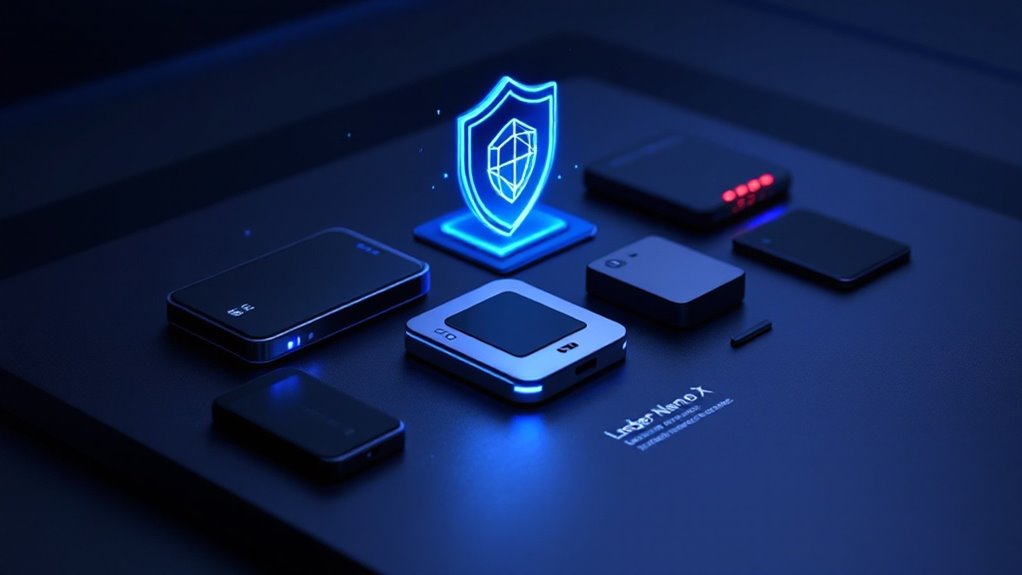MemeCoinCook.com serves up spicy crypto memes and info for entertainment only—this ain’t financial, investment, legal, or professional advice! Whipped up with AI flair, our content might have some half-baked bits, so DYOR before you dive into the crypto pot. NFA, folks—we’re just tossing out ideas, not guarantees. We make no claims about the accuracy, legality, or tastiness of our posts. Sip our content at your own risk! Check our Terms of Use for the full recipe.

Best Digital Wallets for Cryptocurrency in 2025
In 2025, top crypto wallets balance security with user experience. For maximum protection, hardware options like Ledger Nano X and Trezor Safe 5 remain industry standards. Mobile users prefer Trust Wallet and Exodus for on-the-go management, while MetaMask dominates Web3 interactions. Security-focused users appreciate ZenGo’s MPC technology. The ideal wallet depends on your specific needs—whether hodling long-term or actively using DeFi. This isn’t financial advice—trade at your own risk. The sections below explore each option’s unique strengths.
Key Takeaways
- Hardware wallets like Ledger Nano X and Trezor Safe 5 offer the highest security for long-term crypto storage.
- Digital wallets with multi-chain support, like Exodus and Trust Wallet, provide flexibility for users holding diverse crypto assets.
- Mobile wallets with cross-device syncing balance convenience and security for everyday cryptocurrency transactions.
- Security features including cold storage, multi-factor authentication, and seed phrase protection are essential for safeguarding digital assets.
- MetaMask remains dominant for Web3 interactions, while specialized wallets like BlueWallet cater to specific cryptocurrency communities.
Top Digital Wallets for Everyday Crypto Use
Maneuvering the crypto landscape requires a dependable digital wallet to serve as your financial base camp. For everyday transactions, several options stand out:
- Exodus supports over 50 blockchain networks and integrates with Trezor hardware wallets.
- Trust Wallet excels in mobile functionality with multi-coin support.
- MetaMask dominates Web3 interactions and Ethereum dApps.
- Zengo offers enhanced security through MPC technology.
- Phantom Wallet serves Solana users with a built-in DApp browser.
Coinbase Wallet has become increasingly popular due to its user-friendly interface and support for numerous digital assets across multiple blockchains.
Each wallet brings its unique strengths to the crypto table. Remember that these wallets store your digital keys rather than the actual cryptocurrencies themselves. Choose one that matches your hodling style. Hot wallets like these provide easy transactions but typically have more security vulnerabilities than cold storage options.
Select your digital stronghold wisely—crypto wallets are as personal as your investment strategy.
This isn’t financial advice—trade at your own risk.
Hardware Wallet Solutions for Maximum Security
When diving into the world of serious cryptocurrency storage, hardware wallets represent the Fort Knox of digital asset protection.
These physical devices store private keys offline, keeping your crypto assets safe from online threats.
Unlike hot storage wallets, hardware wallets provide immunity from online attacks including hacking attempts.
Top options include:
- Ledger Nano X (supports 5,500+ cryptocurrencies)
- Trezor Safe 5 (offers passphrase protection)
- Keystone 3 Pro (ideal for NFT collectors)
Prices range from $59 to nearly $400, depending on features.
Many provide seed phrases for recovery if your device is lost or damaged.
Always ensure your wallet can display transaction call data to prevent blindly signing potentially malicious operations.
For optimal security, always purchase from authorized retailers to avoid counterfeits that could compromise your assets.
This isn’t financial advice—trade at your own risk.
Mobile Wallets for On-the-Go Cryptocurrency Management
As modern cryptocurrency adoption grows, mobile wallets have emerged as essential tools for managing digital assets without being tethered to a desktop computer.
These sleek applications offer convenience without sacrificing essential security features, perfect for crypto enthusiasts who need access to their portfolios anywhere. Some mobile wallets also provide direct access to liquidity pools in DeFi platforms, allowing users to earn passive income while on the move.
- Multi-platform versatility – Available on iOS and Android with cross-device syncing
- User-friendly interfaces – Even crypto newbies can navigate with ease
- Non-custodial options – Keep your keys, keep your coins
- Multi-asset support – No need for separate wallets for every coin you hodl
- Regular security updates – Because nobody wants their digital gold stolen
According to security experts, the best practice is to use hot wallets like Rabby for daily transactions while keeping long-term investments in hardware wallets for maximum protection.
Phantom Wallet offers exceptional balance between security and convenience with its intuitive design and recently expanded support for multiple blockchains like Solana, Ethereum, and Polygon.
This isn’t financial advice—trade at your own risk.
Specialized Wallets for Specific Cryptocurrencies
Unlike one-size-fits-all solutions, specialized cryptocurrency wallets provide purpose-built features for specific blockchains and use cases.
Bitcoin enthusiasts often gravitate toward BlueWallet for mobile use or Sparrow for desktop management.
Meanwhile, Ethereum users typically prefer MetaMask for its seamless dApp integration and ERC-20 token support.
Litecoin holders can benefit from wallets that support the faster transaction speed inherent to this cryptocurrency compared to Bitcoin.
DeFi lovers benefit from wallets like Rainbow or Argent, which streamline interaction with decentralized protocols.
For those hodling multiple chains, Exodus and Trust Wallet offer extensive multi-chain support.
Hardware options like Trezor and Ledger provide cold storage security for serious investors protecting their crypto assets.
Electrum offers a lightweight and fast experience specifically designed for Bitcoin holders that supports both hot and cold wallet configurations.
This isn’t financial advice—trade at your own risk.
Security Features to Look for in Crypto Wallets
The selection of specialized wallets addresses unique cryptocurrency needs, but security remains the cornerstone of any wallet worth its digital salt.
When evaluating crypto wallets in 2025, prioritize these critical security features:
- Cold storage capability – keeps your crypto offline where hackers can’t reach it
- Multi-factor authentication – because one password is like having a cardboard fortress
- Open-source firmware – transparency helps spot vulnerabilities before the bad guys do
- Seed phrase protection – offline backups on metal beat screenshots any day
- Anti-phishing mechanisms – helps avoid the “oops, where did my Bitcoin go?” moment
Hardware wallets like Ledger Nano X provide superior protection through secure element chips that isolate private keys from potential online threats. Understanding gas fees is crucial when sending Ethereum-based tokens, as network congestion can significantly impact transaction costs. Transactions on hardware wallets are typically irreversible, so thorough verification before confirming is essential to prevent permanent loss.
This isn’t financial advice—trade at your own risk.
Frequently Asked Questions
How Do Taxation Obligations Differ Between Hardware and Software Wallets?
Taxation obligations differ primarily in reporting requirements; hardware wallets require manual transaction tracking and documentation, while software wallets often automatically track transactions through exchange integration, simplifying compliance with wallet-by-wallet accounting rules.
Can Digital Wallets Protect Cryptocurrencies During Major Market Crashes?
Like umbrellas in a hurricane, digital wallets shield assets from theft but not from market value declines. They secure private keys during crashes, not token prices themselves.
What Steps Should Be Taken if a Wallet Provider Ceases Operations?
When a wallet provider ceases operations, users must promptly withdraw funds, export private keys, identify wallet type (custodial/non-custodial), and transfer assets to a compatible alternative wallet to maintain control.
How Do Wallets Handle Airdrops and Cryptocurrency Forks?
Like trees shedding seasonal gifts, wallets handle airdrops through automatic detection and claim interfaces, while managing forks by supporting both chains and implementing replay protection mechanisms for user security.
Are Wallet Recovery Phrases Standardized Across Different Platforms?
Most wallet recovery phrases follow the BIP-39 standard, enabling cross-platform compatibility. However, some wallets use proprietary systems, limiting recovery options to their specific ecosystem or compatible platforms.
Conclusion
Choosing carefully creates confidence in crypto custody. The perfect pick protects precious portfolios while providing practical performance for daily digital dealings. Whether hardware havens or mobile money managers, your wallet works wonders when wisely selected. Security stays significant as savvy systems safeguard stored stashes. Find the fitting financial fortress for your future.
This isn’t financial advice—trade at your own risk.


